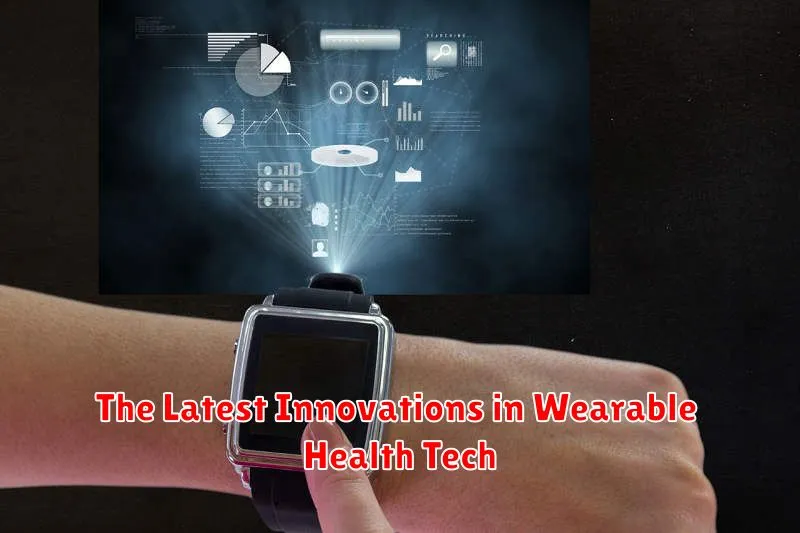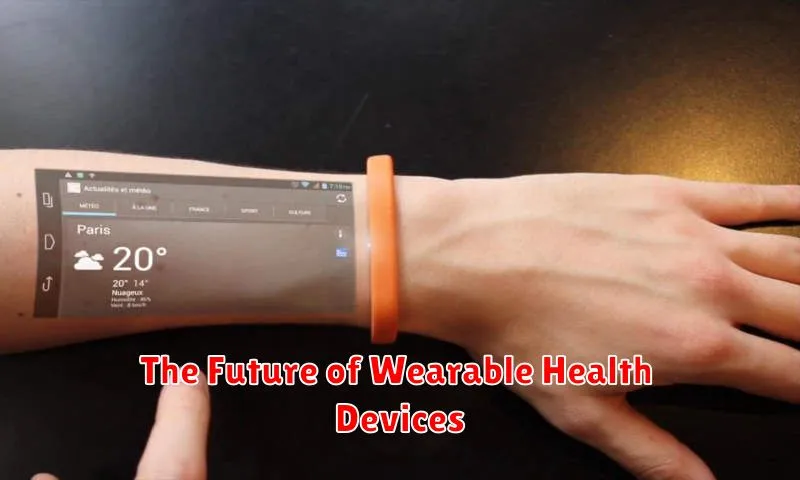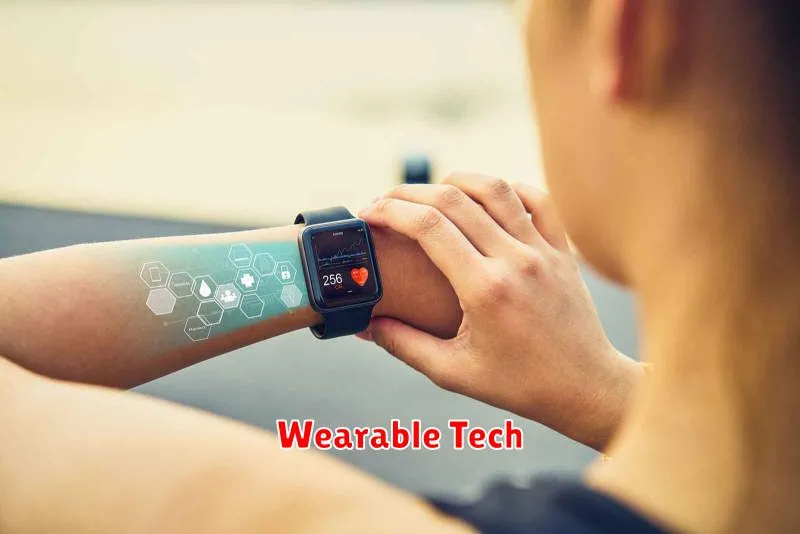The world of wearable health technology is rapidly evolving, offering a glimpse into a future where health monitoring and management are seamlessly integrated into our daily lives. From smartwatches that track heart rate and sleep patterns to fitness trackers that analyze our movement and calorie intake, these devices are revolutionizing the way we approach our well-being. But the potential of wearable technology goes far beyond fitness and activity tracking. As innovation progresses, these devices are becoming increasingly sophisticated, paving the way for personalized medicine, early disease detection, and improved patient outcomes.
This article delves into the exciting advancements shaping the future of wearable health technology. We’ll explore the latest innovations, discuss the potential benefits and challenges, and examine how these devices are poised to transform the healthcare landscape. Join us as we uncover the transformative power of wearable technology and its profound impact on the future of healthcare.
The Latest Innovations in Wearable Health Tech

Wearable health technology is rapidly evolving, offering exciting new possibilities for personal health monitoring and management. From smartwatches to fitness trackers, these devices are becoming increasingly sophisticated, with advanced sensors and data analytics capabilities.
One of the most significant innovations is the integration of biometric sensors, enabling real-time tracking of vital signs such as heart rate, blood oxygen levels, sleep patterns, and even stress levels. These sensors are becoming more accurate and miniaturized, allowing for continuous monitoring without discomfort.
Another exciting development is the emergence of artificial intelligence (AI) in wearable health tech. AI algorithms can analyze vast amounts of data collected from wearables, identifying patterns and providing personalized insights into individual health trends. This allows for early detection of potential health issues and proactive intervention.
Furthermore, connected healthcare is revolutionizing the way we interact with healthcare professionals. Wearable devices can seamlessly share data with doctors and other healthcare providers, enabling remote monitoring, personalized treatment plans, and faster diagnosis.
The future of wearable health technology holds even greater promise. Advancements in areas such as biometric sensing, AI, and connected healthcare are poised to revolutionize healthcare delivery and empower individuals to take control of their well-being.
How Wearable Devices are Transforming Healthcare
Wearable technology is revolutionizing the healthcare landscape, empowering individuals to take control of their health and well-being. These devices, ranging from smartwatches to fitness trackers, collect a wealth of data on vital signs, activity levels, and sleep patterns, providing valuable insights into individual health trends.
One of the most significant impacts of wearable devices is their ability to enable real-time health monitoring. Patients with chronic conditions, such as diabetes or heart disease, can use wearables to track their blood glucose levels, heart rate, and other vital signs, allowing for early detection of potential problems and proactive management of their conditions.
Wearables are also playing a crucial role in personalized medicine. By gathering data on an individual’s lifestyle and health patterns, healthcare providers can tailor treatment plans and provide personalized recommendations. This approach can lead to more effective interventions and better health outcomes.
Moreover, wearable technology is fostering a proactive approach to healthcare. By tracking their activity levels, sleep quality, and other health metrics, individuals can identify areas where they can improve their health and make necessary lifestyle changes. This empowers patients to become active participants in their own healthcare journey.
In conclusion, wearable devices are transforming healthcare by providing real-time monitoring, enabling personalized medicine, and promoting a proactive approach to health management. As technology continues to advance, wearable devices are poised to play an increasingly prominent role in the future of healthcare, empowering individuals to live healthier and more fulfilling lives.
AI in Wearable Health Technology
The integration of artificial intelligence (AI) into wearable health technology is revolutionizing the healthcare landscape. AI algorithms can analyze vast amounts of data collected by wearables, providing insights into an individual’s health and well-being. This enables personalized health monitoring, early disease detection, and proactive interventions.
One of the key applications of AI in wearable health technology is predictive analytics. By analyzing data from sensors like heart rate monitors, accelerometers, and sleep trackers, AI algorithms can identify patterns and predict potential health risks. This allows individuals to take preventive measures and consult healthcare professionals early on, potentially preventing serious health issues.
Furthermore, AI-powered wearables can facilitate remote patient monitoring. By transmitting data to healthcare providers in real time, wearables enable continuous monitoring of patients’ vital signs, medication adherence, and overall health status. This allows for timely intervention and personalized care, even for individuals living in remote areas or with limited access to healthcare.
AI is also enhancing the accuracy and efficiency of disease diagnosis. By analyzing data from wearables, AI algorithms can identify subtle changes in physiological parameters that may indicate the presence of a disease. This can lead to earlier diagnosis and more effective treatment strategies.
The future of AI in wearable health technology holds immense promise. As AI algorithms become more sophisticated and wearables become more integrated into our lives, we can expect even more advanced and personalized healthcare solutions. From AI-powered virtual assistants that provide health guidance to personalized fitness programs tailored to individual needs, the possibilities are endless.
Challenges in Wearable Health Tech Adoption
Despite the growing popularity of wearable health technology, there are still significant hurdles to overcome before it can be widely adopted and integrated into healthcare systems.
One major challenge is data accuracy. While wearables can track various physiological metrics, the accuracy of this data can vary significantly depending on the device, individual user, and environmental factors. This variability can lead to misinterpretations and potentially inaccurate diagnoses or treatment decisions.
Another challenge is data privacy and security. Wearables collect sensitive personal health data, and ensuring its security and responsible use is paramount. Concerns about data breaches, unauthorized access, and the potential for misuse can hinder adoption, especially among privacy-conscious individuals.
Interoperability is also a key barrier. The lack of standardized data formats and communication protocols between different wearable devices and healthcare systems can create fragmented data and hinder the seamless integration of wearable data into clinical workflows.
Furthermore, cost and accessibility remain significant concerns. Many wearable devices can be expensive, limiting their accessibility to certain demographics. The cost of integration and data analysis can also be a barrier for healthcare providers.
Finally, user acceptance and engagement are crucial for successful adoption. Wearables require consistent use and engagement to collect meaningful data, and factors like user comfort, device aesthetics, and the perceived value of the data collected can influence user adherence.
Addressing these challenges is essential for the future of wearable health technology. Addressing these challenges is crucial to unlock the full potential of wearable health technology and its ability to revolutionize healthcare.
The Future of Wearable Health Devices

The realm of wearable health technology is rapidly evolving, promising a future where personalized healthcare is readily accessible and proactive health management is the norm. Wearable health devices are poised to revolutionize how we monitor, diagnose, and treat health conditions, ushering in a new era of preventative healthcare.
Advancements in sensor technology, artificial intelligence, and miniaturization are driving this transformation. Future wearables will be equipped with more sophisticated sensors capable of capturing a wider range of physiological data, including heart rate variability, blood oxygen levels, and even subtle changes in body composition. This data will be analyzed in real-time by AI algorithms, providing personalized insights and alerts about potential health risks.
Beyond monitoring, wearable devices are becoming increasingly adept at diagnosing health conditions. Early detection is crucial for effective treatment, and wearables are enabling continuous health monitoring that can identify subtle changes indicative of disease development. These devices can detect conditions like cardiovascular disease, diabetes, and even certain types of cancer with greater accuracy and earlier intervention.
The future of wearable health technology extends beyond diagnosis to encompass personalized treatment. Wearables will be integrated with therapeutic devices, allowing for real-time adjustments to medication dosages or even the delivery of targeted therapies. This level of personalization will ensure optimal treatment outcomes based on individual needs and responses.
As wearable technology continues to advance, we can expect to see a convergence of devices and data. Wearable health data will be seamlessly integrated with electronic health records, empowering healthcare providers with a comprehensive understanding of their patients’ health. This interconnectedness will facilitate more informed decision-making and better overall care.
The future of wearable health devices holds immense potential for improving health outcomes and enhancing quality of life. As these devices become more sophisticated and integrated into healthcare systems, we can anticipate a future where personalized health management and preventative care become a reality for all.
Case Studies: Successful Wearable Health Tech Solutions
The wearable health technology market is rapidly expanding, with countless devices and solutions emerging to improve health outcomes. But what truly makes a successful wearable health tech solution? Examining real-world case studies can offer valuable insights into what works and what doesn’t.
One compelling case study is the success of Fitbit. This wearable device has become ubiquitous, particularly among fitness enthusiasts. Fitbit’s success can be attributed to its user-friendly interface, robust activity tracking capabilities, and social features that encourage users to stay motivated. Beyond basic fitness tracking, Fitbit has also expanded into sleep monitoring and even heart rate monitoring, further enhancing its value proposition.
Another noteworthy example is Apple Watch. While not exclusively focused on health, Apple Watch has integrated various health-related features, including heart rate monitoring, ECG, and fall detection. Its integration with Apple’s broader ecosystem and user-friendly design have contributed to its wide adoption. The Apple Watch has even demonstrated its potential in early detection of health issues, such as atrial fibrillation.
In the realm of chronic disease management, Dexcom’s continuous glucose monitor (CGM) stands out. For individuals with diabetes, the Dexcom G6 provides real-time glucose readings, empowering them to make informed decisions about their insulin dosages. The device’s accuracy and reliability have been crucial in helping diabetic patients manage their condition more effectively.
These case studies highlight the diverse applications and potential of wearable health tech solutions. From fitness tracking to chronic disease management, these devices are already making a tangible difference in people’s lives. As technology continues to advance, we can expect even more innovative and impactful wearable health tech solutions to emerge in the future.

